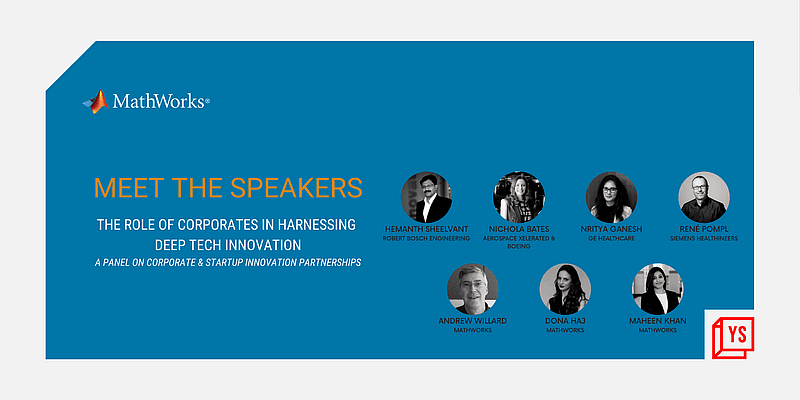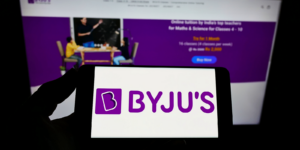The last few years have witnessed the growth of deeptech startups, where technologies like AI, robotics, and even quantum computing have emerged to become visible and impactful to a wider audience.
Recent reports also state that investment in the deeptech startup ecosystem has almost tripled over the recent years, with the numbers increasing from $15 billion in 2016 to more than $60 billion in 2020.
MathWorks, a leading developer of mathematical computing software, has been facilitating virtual panel discussions to bring together voices of accelerators/incubators, governmental bodies, startups and other stakeholders in the ecosystem. The third such panel in the series was ‘The Role of Corporates in Harnessing DeepTech Innovation: A Panel on Corporate & Startup Innovation Partnerships’.
The panel was moderated by Andrew Willard, Global Manager, Accelerator and Startup Program at MathWorks, with eminent names as panelists like Hemanth Sheelvant – Hub Leader, India – Corporate Innovation with startups at Robert Bosch Engineering and Business Solutions Private Limited; Nichola Bates – Managing Partner at Aerospace Xelerated and Head of Global Accelerators and Innovation Programs at Boeing; Nritya Ganesh – Director of Program Management, Leader-GEHC India Edison™ Accelerator at GE Healthcare; René Pompl – Senior Director, Venture Technology at Siemens Healthineers.
Why should startups look at corporate incubation?
Corporate incubation centres ensure that the startups are facilitated with the required range of tools, office facilities, administrative support, and of course, mentoring, thereby, providing an extra edge to the startups, and support the budding entrepreneurs.
MNCs can help with customer connections with product validation, exposure to domain expertise, and help startups go off the ground, according to Nritya. “Today, MNCs are looking at young innovators to bring freshness and disruptive solutions to the table, where they can work together and take solutions to the customer. The nature and the intent of partnership need to be well-established, and both the parties need to be transparent. Start-ups need to start believing that MNCs are enablers and partners, rather than encroachers,” added Nritya.
Thus, leveraging a two-way learning opportunity, strategic partnerships are important for both big and small companies, and there’s a lot that can be done on how both parties can get the most value out of these partnerships.
How do MNCs structure their startups programs?
“When I joined the company, it was around the same time that Boeing Horizon X was originally established as a response to Boeing turning 100 years old. Post that, we’ve recently spun out our core venture fund into a partnership with private equity firm AeroEquity Industrial Partners (AEI). So it’s AEI Horizon X, and that was an evolution for us to, again, take away some of the bureaucracy and ensure that we could move as quickly as possible, and was not losing that strategic insight and the benefit to our portfolio teams of having an intimate relationship with Boeing. It’s a journey that will continue to evolve,” added Nichola.
Defining the two dimensions of the growth accelerator, Hemanth said, “One of them is Robert Bosch Venture Capital, which functions globally to fund external startups, and then we are also having what we call a venture client model, where we look at partnering with startups.”
GE Healthcare is fairly new in this domain. “We just entered our first cohort. GE is accelerating the transformation of healthcare with Edison, an advanced intelligent offering used by GE Healthcare’s internal developers and partners to develop new healthcare applications and services. We believed in the power of a collaborative ecosystem,” explained Nritya.
“The program looks at harnessing the brainpower and the energy that these startups bring, where we could learn from them, look at what their solutions are all about, see how we can refine it together before we go to the customer, and how we, together, can then deliver affordable healthcare for the customers globally,” she added.
How does MNC startup programs address global perspectives?
“For example, what Canada might want to do with its ecosystem is very different from what India might want to do. In India, we work on use cases based on focus areas that we define internally, take the solution to the customers, and then we get into a pilot. Even within the Indian accelerator program, when we onboard third parties and the solutions, they become part of our ecosystem. We try to keep it very globally relevant,” said Nritya.
Boeing invests a lot of time understanding the startup ecosystem. “We don’t intend to displace any of the grassroots activity that’s happening in a location already. We want to support it as best we can and fill in the gaps,” added Nichola.
“We never set our full program curriculum until we have selected those teams that are going to be part of the program. Every single one of those will come with very different needs, and we need to be very agile in terms of building exactly what they need for the program,” she said.
Post creating the structure of the program, it is also important to have a physical location for any of these, especially during the prevailing times where the world has shifted to virtual screens. “We had a good startup studio to collaborate and work with consultants and partners. So we have MathWorks as a partner. Besides, the connection of the startups to either the venture capital team or the senior management in the pre-Covid era would have also been possible over a coffee or a lunch, which underwent a change in the last two years,” added Hemanth.
“But today, in the virtual setup, you have to make a dedicated effort, set up those meetings, and ensure there’s active participation. Each start-up, for example, gets 10 minutes with a CEO, CTO, and CFO. They do an elevator pitch. At certain times, physical interactions help a lot, especially for networking,” he said.
What do MNCs gain from startups?
“When we had started initially, we were not getting the right kind of startups which we wanted to get into our cohorts. But then with Open Bosch, which is a network global organisation or DNA startup alliance, we made it clear to the startups that we wanted to fall into one of these categories. We wanted to work with them where they are recognised, and have a part to play,”shared Hemanth.
Corporates are large, bureaucratic organisations that are much slower than the startup world. “We’re very much fighting the good fight for startups, and are here to support them. But we will be honest with them about some of the challenges that we’re battling, because it helps them understand how they can best enable us. So I think that it’s incumbent on us, and for the startups, my advice would be, hold our feet to the fire. Talk to one another about your experiences, and talk to us about your experiences that are difficult so that we can help find a way around them,”said Nichola.
To conclude, MathWorks supports accelerator, incubator programs and their startups with access to their industry standard tools and support. Over 400 accelerators, and more than 3000 startups worldwide in industries such as automobile, medical devices, robotics and many more use MathWorks tools to research projects, develop prototypes, and take products from concept to production. Learn more about it here.





![Read more about the article [Funding alert] Hike raises undisclosed round from Tinder co-founders, Binny Bansal, Kunal Shah, others](https://blog.digitalsevaa.com/wp-content/uploads/2021/08/Image12g5-1629790075012-300x150.jpg)




